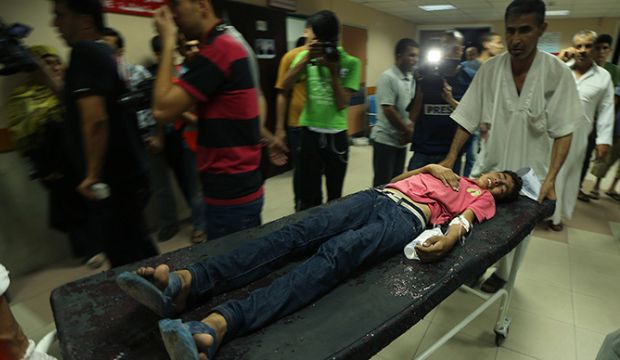
A wounded Palestinian boy, who hospital officials said was injured in an Israeli air strike, is wheeled into a hospital in Gaza City on July 12, 2014. (Reuters/Mohammed Salem)
Ramallah, Asharq Al-Awsat—As the Israeli military continued its latest offensive against Gaza for the seventh day on Monday, the territory’s hospitals are struggling to cope with the influx of dead and wounded and are desperately seeking new supplies of vital drugs and equipment.
Dr. Sobhi Skaik, head of surgery at the Al-Shifa Hospital in Gaza, described scenes of horror and fear from the overcrowded wards. Speaking by telephone on Friday, he said: “We keep receiving dead bodies and many, many injuries. Bodies just keep coming and coming.”
“We are not just getting patients with one injury that needs attending, we are getting a patient with his brain coming out of his skull, his chest crushed, and his limbs missing. And we are getting dead bodies that come to us in pieces,” he added.
An airstrike occurring an hour before our conversation had brought the hospital six dead bodies and three patients needing immediate surgery. Dr. Skaik explained how the hospital has only six operating rooms, few medical supplies, and exhausted staff. Frequent electricity cuts further endanger those in the operating theater and Intensive Care Units. Around 50 percent of the hospital’s staff are working without pay and have been for many months as a result of financial and political issues.
“The number of injuries is huge compared to the hospitals’ capacity,” said Fikr Shalltoot, the Gaza program director for Medical Aid for Palestinians, an organization desperately trying to raise funds to procure more supplies. “There are 1,000 hospital beds in the whole of Gaza. An average of 200 injuries are coming to them every day.”
“The hospitals are basically unable to cope,” she said.
Prior to the beginning of the military campaign, Gaza was already without 30 percent of essential drugs, according to Gaza’s Health Ministry spokesman, Ashraf Al-Qedra.
On Friday, Doctors Without Borders warned that the response to emergency needs at hospitals in Gaza could worsen quickly “due to already existing chronic shortages of drugs and disposables.”
“The response and preparedness of the health sector is at a very low level, and we are concerned about a possible collapse of health services. We are making an urgent appeal for 40 million US dollars to support the Ministry of Health in providing essential supplies for healthcare sufficient for six months,” said Dr. Ala Alwan, the World Health Organization’s regional director for the Eastern Mediterranean.
The Israeli airstrikes, part of campaign the Israeli Defense Forces (IDF) have dubbed ‘Operation Protective Edge,’ have so far claimed the lives of an estimated 170 Palestinians and left a further 1,200 injured, according to the Palestinian authorities.
As of Sunday over 20 percent of the death-toll had been made up of children and at least 80 percent of the dead are civilians, according to the UN Office of Coordination for Humanitarian Affairs. The organization also says Gaza is in urgent need of 60 million dollars’ worth of medical equipment and medical referrals out of the territory
Military jets have bombed over 1,100 targets across the blockaded strip since the operation began, bombarding the territory on average once every five minutes. Some of the targets struck have been Gaza’s beleaguered medical facilities. Last Thursday’s targets included a charitable society for people with disabilities, with the attack leaving two young women dead. The Israeli military also reportedly fired “warning” missiles at Gaza’s only medical rehabilitation center for the elderly on Saturday, despite the presence of international activists staying there in the hope of deterring attacks.
Despite international calls to halt the airstrikes, Israeli Prime Minister Benjamin Netanyahu brushed off the possibility of a ceasefire in remarks to reporters on Friday, instead saying that targets will continue to be hit until long-term quiet can be assured for Israeli citizens. The rising Palestinian causalities are the fault and responsibility of Hamas, he said.
While in the Israeli cities of Tel Aviv and Ashdod rocket warning sirens are a regular occurrence, there have been no deaths reported in Israel due to rocket fire from Gaza.
Netanyahu has dismissed criticism from the likes of UN Secretary-General Ban Ki-moon and the UN high commissioner for human rights, Navi Pillay, saying Israel’s aerial campaign is aimed at military targets.
“We strike at their armed forces and sometimes we hit civilians by mistake,” Netanyahu said from the Defense Ministry in Tel Aviv on Friday.
As the sun sets in Gaza, its people remain braced for another night of airstrikes, and the hospitals await the arrival of yet more devastating injuries and dead bodies.

I am from Vancouver,Canada and I wanted to say that Israel should be charged with genocide against the people of Gaza.The western govs. are complicit in this genocide against the people of Gaza and should be condemned.The majority of people in the world support the people of Gaza in this fight against Israeli barbarianism.
There are some good govs. in the world that support the people of Gaza such as the govs. of Cuba,Venezuela and Bolivia and several other Latin American govs.From the River to the Sea Palestine will be Free.